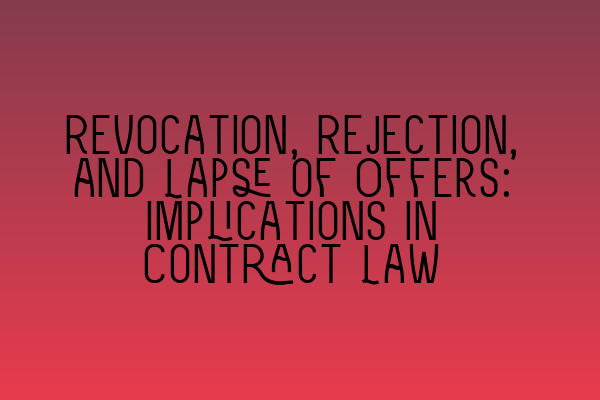Revocation, Rejection, and Lapse of Offers: Implications in Contract Law
Introduction
Contract law is a complex field that governs the formation and enforcement of agreements between parties. Within contract law, the concepts of offer and acceptance play a fundamental role. An offer is a communication made by one party (the offeror) to another (the offeree), expressing a willingness to enter into a legally binding agreement on specified terms. However, offers can be revoked, rejected, or may lapse, each of which has significant implications in contract law. In this article, we will explore the nuances of revocation, rejection, and lapse of offers, and their implications in contract law.
Revocation of Offers
Revocation of an offer refers to the act of the offeror withdrawing the offer before it has been accepted by the offeree. The general rule is that an offeror has the power to revoke or withdraw the offer at any time before acceptance. However, there are certain exceptions to this rule. For instance, if the offeror has made a promise to keep the offer open for a specified period, known as an option contract, then the offeror cannot revoke the offer within that period. Similarly, if the offeree has provided consideration or relied on the offer in a way that the offeror should have reasonably expected, the offeror may be estopped from revoking the offer.
Rejection of Offers
Rejection of an offer occurs when the offeree declines the offer, either expressly or through conduct that is inconsistent with acceptance. Once an offer has been rejected, it is no longer capable of acceptance and the offer is terminated. It is important to note that a counteroffer, which proposes different terms or conditions, is considered a rejection of the original offer and forms a new offer.
Lapse of Offers
An offer may lapse in various circumstances. Firstly, an offer may lapse if a specific time period for acceptance has been specified, and the offeree fails to accept within that timeframe. Secondly, an offer may lapse if the offeree fails to accept within a reasonable time, taking into account the nature of the offer, the course of dealings between the parties, and any relevant industry customs or practices. Furthermore, an offer may also lapse if either party dies, becomes incapacitated, or the subject matter of the offer is destroyed or becomes illegal before acceptance.
Implications in Contract Law
The revocation, rejection, and lapse of offers have significant implications in contract law. As mentioned earlier, the revocation of an offer may be subject to exceptions in certain circumstances. Therefore, it is crucial for both offerors and offerees to be aware of these exceptions to avoid potential disputes. Furthermore, the rejection of an offer terminates the offer, giving the offeror the freedom to enter into agreements with other parties. This underscores the importance of clear communication and understanding between parties to ensure each party’s intentions are properly conveyed.
In conclusion, the concepts of revocation, rejection, and lapse of offers are vital in understanding contract law. These concepts often shape the enforceability of agreements and influence the rights and obligations of the parties involved. Therefore, it is imperative for solicitors and legal professionals to have a comprehensive understanding of these concepts to effectively advise their clients and navigate the complexities of contract law.
To learn more about various aspects of legal practice, check out the following related articles:
– Barrister vs. Solicitor: A Comprehensive Comparison
– Exploring Different Solicitor Specializations: Finding Your Niche
– Embracing the Rise of Virtual Law Practices
– Unveiling Real-Life Case Studies: Insights into Legal Practice and Decision-Making
– Exploring Solicitor Salaries in the UK: Average Earnings and Factors Affecting Income
